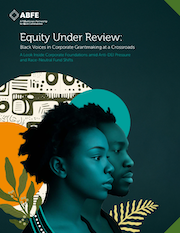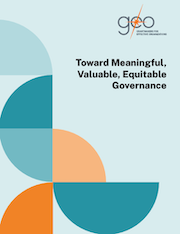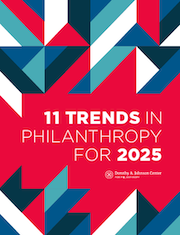Best Practice

This ABFE report reflects on the evolving corporate philanthropy's commitment to Black communities.

This Grantmakers for Effective Organizations's latest report outlines the potential of more effective governance, highlighting promising practices that grantmakers are testing and learning from as they explore governance purpose, roles, relationships and processes.

Dorothy A. Johnson Center for Philanthropy ninth annual report on trends in the sector aims to help fundraisers, grantmakers, donors, consultants, and more anticipate and prepare for what's next in our field.
Adopted by CNJG”s Board of Trustees in October 2023, these eight Principles offer philanthropy a source of direction for their own equity journey.
Foundations are systems. They have their own cultures and related assumptions, norms, standards, and practices. All of these personal, social, and structural factors affect our ability to learn. This tool is to help foundations take stock of their learning needs and opportunities with a dispassionate (evaluative) look at themselves as systems and how people work within them.
The Johnson Center for Philanthropy has developed this new Program Officer Competency Model©. A competency model delineates the knowledge, skills, abilities, and other characteristics (KSAOs) that are required for effective performance in a particular job or profession.
For philanthropy to advance equity in all communities, especially low-income communities and communities of color, it needs to be able to understand the demographics of the organizations being funded (and declined), the people being served and the communities impacted. That data should be used to assess practices and drive decision making.
This publication provides a wealth of background and program ideas for improving rural mobility through existing and emerging technology. It offers insights about what’s already working and what is possible from the perspective of providers and thought leaders. It is a general introduction tailored for funders but useful for anyone. It does not require a background in technology or aging.
This article written by Kerry McHugh Vice President and Program Officer at the Helen J. Serini Foundation, an independent foundation located in Maryland, offers ten things to do when meeting with a prospective grantee. She encourage funders to think of these interactions as relationship-building rather than a transaction.
Research shows that one of the greatest impediments to a prosperous future for all of Michigan's people is unequal access to resources. To help foundation leaders and their boards begin essential conversations about marginalized populations and determine the extent to which their organization's culture and grantmaking practices are aligned with a commitment to expanding opportunity in the communities they serve, CMF developed this discussion guide and self-assessment.
